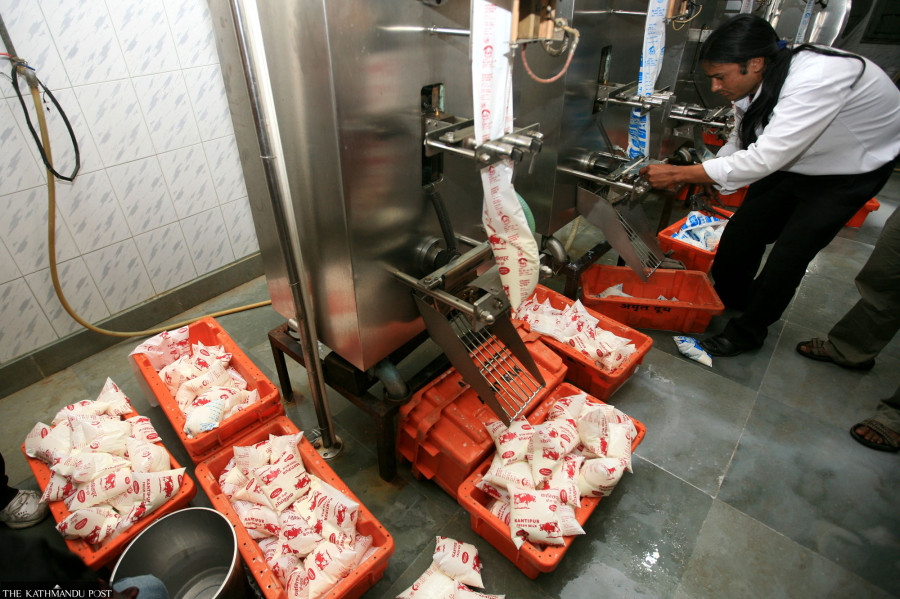Money
Dairy flush puts everyone in trouble
On Sunday, Oli said he had directed private dairies to settle farmer dues. However, they have problems, including stockpiles and payment delays.
Post Report
Prime Minister KP Sharma Oli on Sunday said that he has directed private dairies to settle the outstanding dues to farmers, an issue that has remained unresolved for the past two years.
However, private dairies argue they are facing a dairy recession, a situation never seen before, and cannot pay farmers even after the prime minister’s ruling. Months ago, private dairies sought a loan from the government, but this was rejected outright.
Responding to questions in Parliament, the prime minister told lawmakers that the state-owned Dairy Development Corporation (DDC) has cleared dairy farmers' dues up to mid-September last year, amounting to Rs2.4 billion.
"The remaining payments will be cleared gradually. The process to settle the outstanding dues of the last five months is underway," he added.
While the government has directed private dairies to compensate farmers, dairy operators claim that low demand and excessive stockpiles make this challenging.
“We are unable to pay farmers due to product stockpiles, but we are making every effort to do so. We currently have unsold powder milk and butter worth around Rs4 billion,” said Raj Kumar Dahal, president of the Dairy Industries Association.
According to him, they owe farmers Rs2 billion.
The ongoing flush season has further increased stockpiles, exacerbating payment delays.
Despite this, private dairies continue to purchase milk from farmers. Dairy producers note that stagnant market demand makes clear payments difficult.
The DDC recently reported increased payment dues and blamed it on the flush season, during which milk production surges, necessitating higher purchases.
The corporation’s outstanding payments have now surpassed Rs700 million.
The DDC even entered an agreement with the private sector nearly two months ago to supply whey to keep cash flowing. The corporation purchases milk worth Rs250 million per month.
Nepal experiences two distinct dairy production seasons—flush and lean. The flush season, running from August to February, results in an oversupply, while the lean season sees reduced production. The production ratio between the lean and flush seasons is approximately 1:3.
Last year, during the flush season, farmer dues had risen to Rs1.5 billion.
“We continue to make payments as long as we have the resources. However, given the current financial strain on dairies, clearing dues as directed by the prime minister is not feasible,” said Dahal.
“We will only be able to make payments if the government provides loans against our dairy stock, if the stored butter and powder milk is sold, or if we no longer need to convert milk into these products,” he added.
Rising dairy prices, with milk exceeding Rs110 per litre, have caused a decline in demand.
Factors such as falling income levels, increased unemployment, and rising youth migration have accumulated unsold stock, leaving farmers unpaid for months.
Nepal’s dairy sector is currently experiencing a downturn.
However, another private sector association claims to have cleared all dues.
“We have 300 private dairies affiliated with the Nepal Dairy Association across the country, and we do not have any outstanding dues towards dairy farmers. Payments are now back on a regular schedule,” said Prahlad Dahal, president of the Nepal Dairy Association.
According to dairy associations, the market receives 3.1 million litres of milk daily, with more than 500,000 litres exceeding the demand.
On December 18 last year, the financially strained DDC signed an agreement to generate revenue by supplying raw cheese to the Manaram Group.
Since December 30, DDC has supplied 1,000 kg of raw cheese or whey daily to Himalayan Dog Chew. Manaram Group exports 100 tonnes of dog chew monthly under the ‘Himalayan Dog Chew’ brand from its plant in Godak, Ilam. DDC’s Biratnagar Milk Supply Scheme supplies the whey.
To mitigate losses, DDC plans to export butter to China. The agriculture ministry has begun working with China’s General Administration of Customs (GACC) to facilitate the process.
In September last year, DDC took a Rs600 million loan to clear outstanding dues.
Both state-owned and private dairies report that the ongoing economic slowdown has dampened demand, limiting cash flow and piling up liabilities to farmers. Many of the products remain unsold for over a year, they say.




 10.12°C Kathmandu
10.12°C Kathmandu












